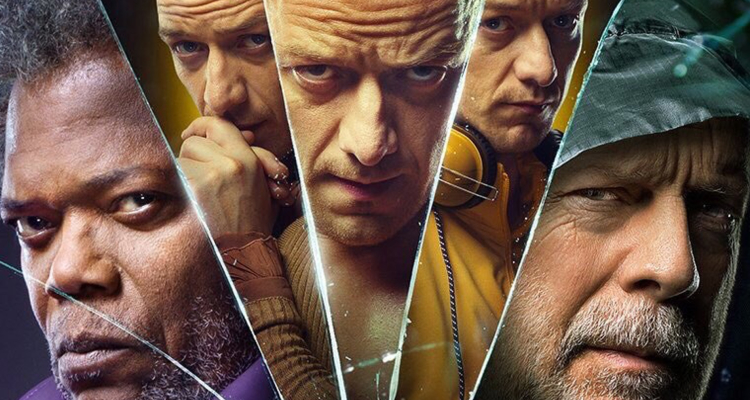After nearly two decades, M. Night Shyamalan has finally made a return to the superhero movie – and with an ambitious crossover event no less.
His first foray into the genre, Unbreakable, long before the birth of the comic-book franchise, was a subtle deconstruction that made a character study of comic-book archetypes. Its unexpected spinoff, Split, offered schlocky, B-movie commentary on trauma as power; seemingly unconnected to the former until the fan-bating cameo at its close.
As a culmination of both, Glass is self-regarding, reconstructed pulp that, while deepening the mythology of its universe, fails to do justice to either its predecessors – or its own promise.
Everyman David Dunn (Bruce Willis; trying to pass off weariness for understatement) is now in his sixties and a widower, but stills fits into that iconic green overcoat. He runs a home security business; aided by his son Joseph (Spencer Treat Clark; bright-eyed and eager), who also provides tech support for his dad on his periodic “walks”.
Dubbed The Overseer by the online community, David’s vigilante wanderings brings him face to face with Kevin Wendell Crumb (James McAvoy; lots) AKA The Horde , whose ultimate personality – the monstrous, cheerleader-chomping Beast – is surprised to discover someone who can exchange blows with him.
Following the pair’s incarceration in the Ravenswood Mental Institute – a severely understaffed proto Arkham Asylum – the film then spends an hour ratcheting back up to the inevitable showdown between impervious hero and fractured villain as Dunn broods, Kevin disassociates, and fellow patient Mr. Glass (Samuel L. Jackson; gleefully chewing scenery) plots.
Meanwhile, the seemingly well-meaning Dr. Staples (Sarah Paulson; brittle yet poised) tries to convince the three that they are mentally ill; that there’s a rational explanation for all of their abilities.
In this, Shyamalan promises a return to the notion of faith vs. rationality, which has provided a throughline for his career thus far. However, rather than develop this – what happens if our hero, or perhaps villain, doubts his own specialness? – the film instead falls back on smug, grandiose meta-commentary, courtesy of the title character.
Mr. Glass, having spent the past nineteen years locked up, faking a stupor, is now reduced to Shyamalan’s avatar; given to grand pronouncements about where exactly we are in the plot. The gradual approach of the aforementioned “showdown” doesn’t make the second act drag any less, especially with so many plot holes lying in wait.
McAvoy is the film’s MVP, turning in another technically virtuosic performance, switching seamlessly between personalities in a single breath. It’s his continued relationship with abuse victim Casey (Anya Taylor-Joy; imploring), whom he very nearly made a meal of in Split, that forms the misplaced emotional heart of the film.
And that’s, perhaps, where the issue lies: Glass, for all its aspirations, feels crucially misfocused. Willis, the former protagonist of the franchise, is given less to do than his son Joseph, ostensibly a secondary/sidekick character, whose super-power of knowing how to use Google has more of an impact on the film’s climax.
Throw in an intrusive cameo and a moment where one character describes proceedings as spectacular, almost down the lens, and you’re approaching Tarantino levels of self-aggrandisement; just without the filmmaking.
Flashbacks to Unbreakable, with all its elegance, stress, too, how gimmicky Shyamalan’s directorial style has become with an over-reliance on off-kilter framing and POV shots betray its essential hollowness.
A succession of third-act twists, meanwhile, only succeed in wrenching the slender narrative completely out of joint. The first is a neat parallel, but, also, essentially a repeat. The second aims to be devastating, but, ultimately, shows contempt for the whole enterprise. The third requires an almost laughable misunderstanding of modern society.
Simultaneously undercooked and belaboured, Glass thinks it’s being subversive, but it’s, at best, silly and self-regarding. What is it that drew Shyamalan to this story, except perhaps a sense of inevitability?
Superheroes team up, so it is written, so has it been done; usually, Justice League aside, to commercial dividends. To augment this with some pop psychology, it was in 2008, the year that saw Shyamalan go from wunderkind to whipping boy with the release of The Happening, that also saw the release of Iron Man and The Dark Knight.
So, even without genuine affection, Shyamalan has plenty of reason to want to make a superhero film – to reclaim the acclaim, or maybe just finally get a payday from the genre (Unbreakable did not break the bank). Nevertheless, Glass is a film that, as a pieced-together continuation of the story, makes Unbreakable worse in retrospect.
Save your money and those precious memories and give this one a miss.
